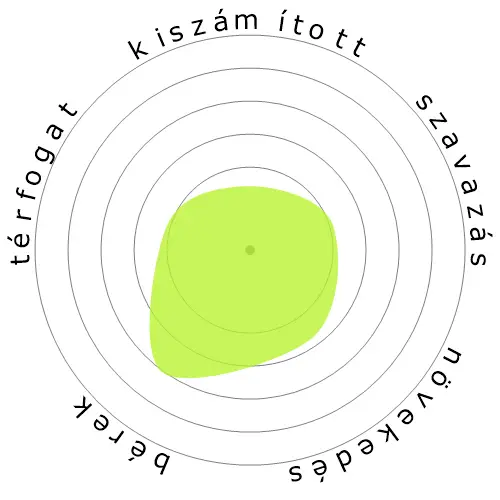Műszaki szerzők




Az emberek ezt is megtekintették
Számított automatizálási kockázat
Közvetlen veszély (81-100%): Az ezen a szinten lévő foglalkozások rendkívül nagy valószínűséggel automatizálásra kerülnek a közeljövőben. Ezek a munkák elsősorban ismétlődő, kiszámítható feladatokból állnak, amelyekhez kevés emberi ítélőképességre van szükség.
További információ arról, hogy mi ez a pontszám, és hogyan számítják ki, elérhető itt.
Felhasználói szavazás
Látogatóink szavaztak, és nem biztosak abban, hogy ez a foglalkozás automatizálásra kerül-e. Azonban az általunk generált automatizálási kockázati szint sokkal magasabb esélyt sugall az automatizálásra: 94% esély van az automatizálásra.
Mit gondol, milyen kockázatai vannak az automatizációnak?
Milyen valószínűséggel fogják Műszaki szerzők robotok vagy mesterséges intelligencia helyettesíteni a következő 20 évben?
Érzelem
A következő grafikon mindenhol szerepel, ahol jelentős mennyiségű szavazat áll rendelkezésre, hogy értelmes adatokat lehessen megjeleníteni. Ezek a vizuális ábrázolások az időbeli felhasználói szavazási eredményeket mutatják, jelentős jelzést adva a hangulat trendjeiről.
Érzelem az időben (évente)
Növekedés
A(z) 'Technical Writers' munkahelyi nyitások száma várhatóan 4,0%-kal nő 2033-ra.
Teljes foglalkoztatottság és becsült állásnyitások
A frissített előrejelzések 09-2025 időpontban esedékesek..
Bérek
A(z) 2023-ban a 'Technical Writers' éves középfizetése 80 050 $ volt, vagyis 38 $ óránként.
'Technical Writers' magasabb összeget kaptak, mint az országos mediánbér, ami 48 060 $-n állt.
Bérek az idők folyamán
Térfogat
2023 időpontjában 47 970 ember dolgozott 'Technical Writers' munkakörben az Egyesült Államokban.
Ez körülbelül a < 0,001% -át képviseli az országban foglalkoztatott munkaerőnek.
Másképp fogalmazva, körülbelül minden 3 ezer. ember 'Technical Writers'-ként dolgozik.
Munkaköri leírás
Írjon technikai anyagokat, mint például berendezési kézikönyveket, függelékeket vagy üzemeltetési és karbantartási utasításokat. Segíthet a kialakítási munkában.
SOC Code: 27-3042.00


Megjegyzések
Leave a comment
The main challenge for an AI is not the technical writing. It is actually making sense of the source material. This will be the main job of technical writers: Explaining to the AI what it needs to write. Technical writers will increasingly be busy with post-editing AI written texts, which will be a very mind numbing task. It will also require fewer people and warrant lower pay.
If you want to know the future of technical writing, look at what has happened to technical translation. If you are a technical writer, you are headed the same way. You will operate AI tools and check the results for lousy pay because you are not actually doing the brain work. Get into nursing or open a funeral home. People will always get sick and die, that's a future-proof occupation.
Curating and organizing the information to feed to the AI, and checking their output for accuracy, may be one of the few jobs left to tech writers.
As technical writers we understand complex systems (as well as the engineer's gibberish that often comes with it) and are able to translate this into a form that is easily understood by the respective user groups, i.e. operators or maintenance personnel.
In my opinion AI nowadays can provide draft text to the technical writers. But it takes a human to process that into understandable content, because only a human can know what is necessary for others to profit from precise instructions and related warnings. Also when it comes to jurisdiction.
Who will be held accountable for injury or death caused by automated AI that simply pretends to be human-like but has otherwise no conscience? I mean, an AI can tell you that a stove is hot, but does this mean it really knows the consequences of touching it?
Some learned it the hard way, I doubt an AI can.
I don’t see this role being completely automated in 10 years.
More importantly, why would anyone pay for a professional to do it?
We are already implementing automated structured reuse on a large scale. People should not underestimate the potential of computational linguistics when combined with machine learning and a knowledge graph-rich future.
Although intelligent content (structured content with human-declared intent) cannot be automated yet, we are already auto-classifying content with additional semantic metadata (taxonomies). AI/ML will continue to assist and eventually replace a significant portion of low-level content development, which will elevate the writer's role to that of an information architect/designer.
Object-oriented content will then become a service called Content-as-a-Service (CaaS), much like an electrical distribution grid.
In TechComm and MarComm, we have been evolving towards this model for many years.
I cannot fathom how AI would somehow be able to do all the things that are required to be done in order to complete a technical writing piece.
AI has already taken over the writing niche . . . people no longer need education to write, software helps them do it. That is all AI could ever do for a writer.
Hagyjon egy választ erről a foglalkozásról